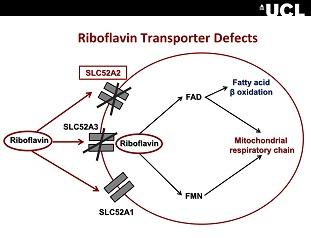Using AI to control energy for indoor agriculture
30 September 2024
Published online 17 August 2012

Mutations to the gene SLC52A3 — a riboflavin (vitamin B2) transporter gene — were recently shown to cause extreme cases of Brown–Vialetto–Van Laere syndrome (BVVL): a rare, neurodegenerative disorder typified by deafness and childhood motor neuron disease (MND).
A new study of individuals and families with the disease, published in the journal Brain, has discovered cases of BVVL caused by another gene SLC52A2.
A team of scientists from the United States, United Kingdom, Lebanon and France screened for mutations to riboflavin transporter genes in members of an extended Lebanese family with BVVL patients and 44 European and Asian patients with BVVL features and childhood MND. Using linkage and exome sequencing, the team identified the pathogenic mutation in a family with members negative for SLC52A3 mutations, but with mutated forms of SLC52A2.
After screening the 44 people, one person was found with a SLC52A2 mutation and two were identified with the SLC52A3 mutation. No mutated forms of the other gene in this group, SLC52A1, were found. The remaining 41 subjects showed no mutations. This group of genes acts as riboflavin transporters.
The authors believe that this discovery shows that defective riboflavin transporter genes play a crucial role in BVVL syndrome, and are investigating the effects of giving riboflavin to people with BVVL the disease. Initial findings have shown that patients with SLC52A3 defects respond to riboflavin treatment clinically.
The same treatment was also administrated to SLC52A2 mutation-positive patients and a number of patients have shown positive response, the most promising being a female patient who demonstrated improvements in her breathing, upper limb strength, visual-evoked and auditory-evoked potential after five months of riboflavin treatment.
"This is the first treatable cause of a type of motor neuron disease," says study co-author Henry Houlden, University College London, "thus highlighting the importance of carrying out the genetic test in all children with a similar clinical picture so that treatment can begin early."
doi:10.1038/nmiddleeast.2012.118
Stay connected: